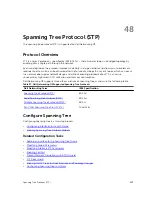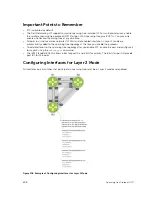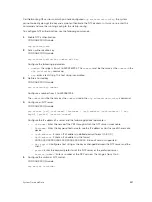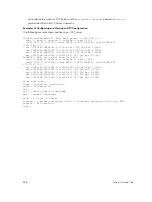
STP Loop Guard
The STP loop guard feature provides protection against Layer 2 forwarding loops (STP loops) caused by a
hardware failure, such as a cable failure or an interface fault. When a cable or interface fails, a
participating STP link may become unidirectional (STP requires links to be bidirectional) and an STP port
does not receive BPDUs. When an STP blocking port does not receive BPDUs, it transitions to a
Forwarding state. This condition can create a loop in the network.
For example, in the following example (STP topology 1, upper left), Switch A is the root switch and Switch
B normally transmits BPDUs to Switch C. The link between Switch C and Switch B is in a Blocking state.
However, if there is a unidirectional link failure (STP topology 1, lower left), Switch C does not receive
BPDUs from Switch B. When the
max-age
timer expires, the STP port on Switch C becomes unblocked
and transitions to Forwarding state. A loop is created as both Switch A and Switch C transmit traffic to
Switch B.
As shown in the following illustration (STP topology 2, upper right), a loop can also be created if the
forwarding port on Switch B becomes busy and does not forward BPDUs within the configured
forward-delay
time. As a result, the blocking port on Switch C transitions to a forwarding state, and
both Switch A and Switch C transmit traffic to Switch B (STP topology 2, lower right).
As shown in STP topology 3 (bottom middle), after you enable loop guard on an STP port or port-channel
on Switch C, if no BPDUs are received and the
max-age
timer expires, the port transitions from a blocked
state to a Loop-Inconsistent state (instead of to a Forwarding state). Loop guard blocks the STP port so
that no traffic is transmitted and no loop is created.
As soon as a BPDU is received on an STP port in a Loop-Inconsistent state, the port returns to a blocking
state. If you disable STP loop guard on a port in a Loop-Inconsistent state, the port transitions to an STP
blocking state and restarts the
max-age
timer.
820
Spanning Tree Protocol (STP)
Содержание Z9000
Страница 1: ...Dell Configuration Guide for the Z9000 System 9 7 0 0 ...
Страница 80: ...grub reboot 80 Management ...
Страница 128: ... 0 Te 1 1 Te 1 2 rx Flow N A N A 128 Access Control Lists ACLs ...
Страница 436: ...Figure 50 Inspecting Configuration of LAG 10 on ALPHA 436 Link Aggregation Control Protocol LACP ...
Страница 439: ...Figure 52 Inspecting a LAG Port on BRAVO Using the show interface Command Link Aggregation Control Protocol LACP 439 ...
Страница 440: ...Figure 53 Inspecting LAG 10 Using the show interfaces port channel Command 440 Link Aggregation Control Protocol LACP ...
Страница 491: ...Figure 70 Configuring OSPF and BGP for MSDP Multicast Source Discovery Protocol MSDP 491 ...
Страница 492: ...Figure 71 Configuring PIM in Multiple Routing Domains 492 Multicast Source Discovery Protocol MSDP ...
Страница 496: ...Figure 73 MSDP Default Peer Scenario 1 496 Multicast Source Discovery Protocol MSDP ...
Страница 497: ...Figure 74 MSDP Default Peer Scenario 2 Multicast Source Discovery Protocol MSDP 497 ...
Страница 498: ...Figure 75 MSDP Default Peer Scenario 3 498 Multicast Source Discovery Protocol MSDP ...
Страница 760: ...Figure 100 Single and Double Tag TPID Match 760 Service Provider Bridging ...
Страница 761: ...Figure 101 Single and Double Tag First byte TPID Match Service Provider Bridging 761 ...






























